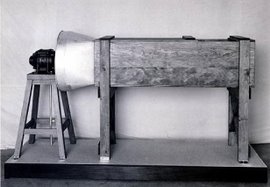I wrote this 20 days ago but wasn't connected to the internet so then I forgot about it until today. Since I have been so remiss in posting here I'm scraping together even the ones I had forgotten.
John Updike wrote a poem called “Peggy Lutz, Fred Murth” on December 13th, 2008. He died shortly after Christmas, less than two weeks later. Several poems from his final months were published in a recent issue of the New Yorker and it took me several times with the issue before I got through more than a line or two of each. Poetry for me requires a very specific state of mind. Patience. Generosity. Curiosity. Patience again… And compassion, or a willingness to be open and sensitive. To let down the guard of my workhorse self and let the cogs in the machine in my head move about, float a bit, and maybe—hopefully—re-attach in some new and different, transformed way. I can’t be doing three or four things at once and I can’t be thinking about any other thing—at least not until moved to do so by the words on the page. Surprisingly, rare as it is in my day-to-day life—this mode, the state poetry is in-- is probably my favorite. Because, it is also the state where I can really feel. Really think. And really listen.
[I love Mach-4 (as in flight not razor) mode too, don’t get me wrong—and I love feeling fast, efficient, productive. But there’s a little something special about that dreamy other place—where the rules of punctuation and linearity fall away.
from the poem:
“I’ve written these before, these modest facts,
but their meaning has no bottom in my mind.
The fragments in their jiggled scope collide
To form more sacred windows. I had to move
To beautiful New England—its triple
Deckers, whited churches, unplowed streets—
To learn how dreary and deadly life can be.”
I really love this poem and this part of it. I grew up in a triple-decker on a hill in Dorchester that the plows often overlooked. Snowstorms meant going out into the world knowing that more than likely the trip home at the end would include a group effort push of the car up the hill.
In the past few months I have been filling out a lot of applications (fellowships, grants) and prepping for some interviews where questions like "tell us about yourself as an artist" laser at me with terrifying frequency. It was terrifying until I really organized my 'story' -- of truths of course-- but where the ordering and delivery can really shape a stranger's understanding. I lined up and made sense of my modest facts. And I am finding Updike's observation to hold true-- their meaning has a sort of infinite bottom.












